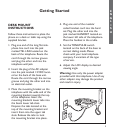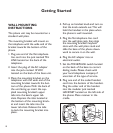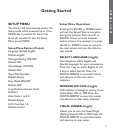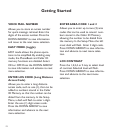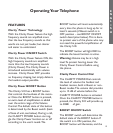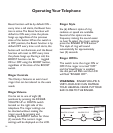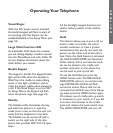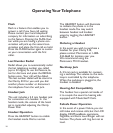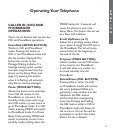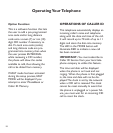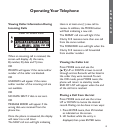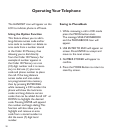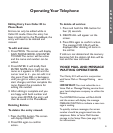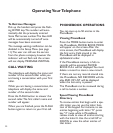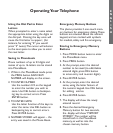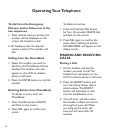
CALLER ID (CID) AND
PHONEBOOK
OPERATIONS:
There are six buttons that control the
CID and PhoneBook operations.
Enter/Dial: (ENTER BUTTON)
Works in CID and PhoneBook
mode. Pressing this button in
CID or the PhoneBook mode will
dial the number displayed.This
button also serves as the
Message Waiting Indicator. If a
message waiting access number
has been programmed into the
phone via the Setup Menu (see
page 12), pressing this button
when it is flashing will automati-
cally dial to retrieve messages.
Mode: (MODE BUTTON)
Allows the phone to be switched
from CID call review to the
PhoneBook or vice-versa. If in
stand-by mode, press once to go
into CID mode, or press twice to
go to PhoneBook mode. If in CID
mode, pressing MODE will switch
to PhoneBook mode. If in Phone
Book mode, pressing MODE will
switch to stand-by screen. From
stand-by mode, holding down the
MODE button for 3 seconds will
cause the phone to enter the
Setup Menu.This button also serves
as a New Call indicator.
Scroll Up/Down: (▲ ▼)
Allows for a scrolling review either
up or down through the CID lists or
the PhoneBook.The list will wrap
around when at the beginning or
the end of the list.
Program: (PROG BUTTON)
Allows numbers on the CID screen
to be saved to the PhoneBook.
It will also allow any number to
be saved manually into the
PhoneBook.
Delete/Erase: (DEL BUTTON)
Pressing DEL in either the CID
or PhoneBook modes will remove
the entry displayed.While pro-
gramming a new number into the
telephone, the DEL button
will function like a backspacing
erase key. Pressing and holding
the DEL button while in CID or
PhoneBook mode will delete all
the entries in the list.You will be
prompted to confirm this action
before the list is deleted.
Operating Your Telephone
E
N
G
L
I
S
H
17



